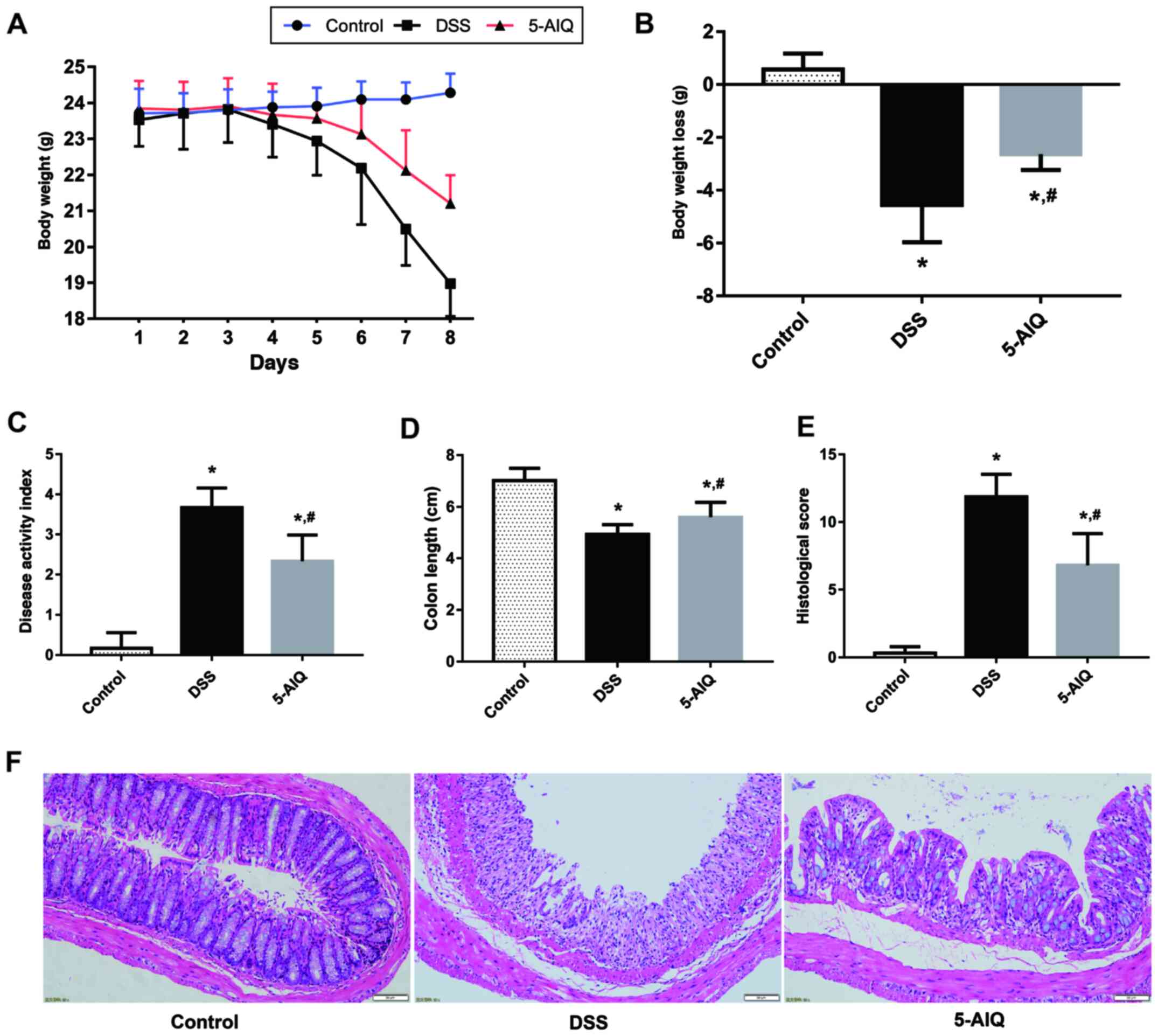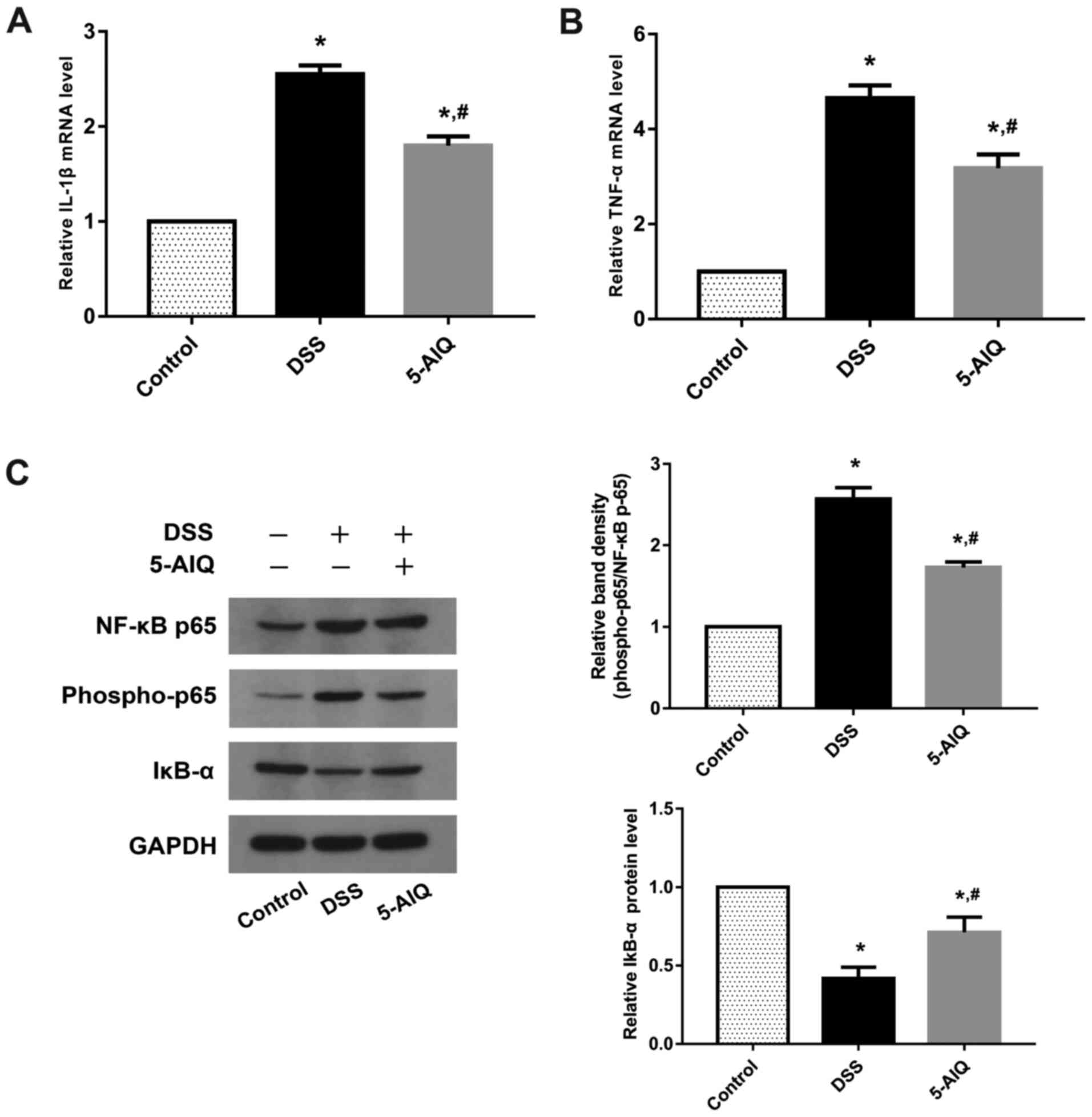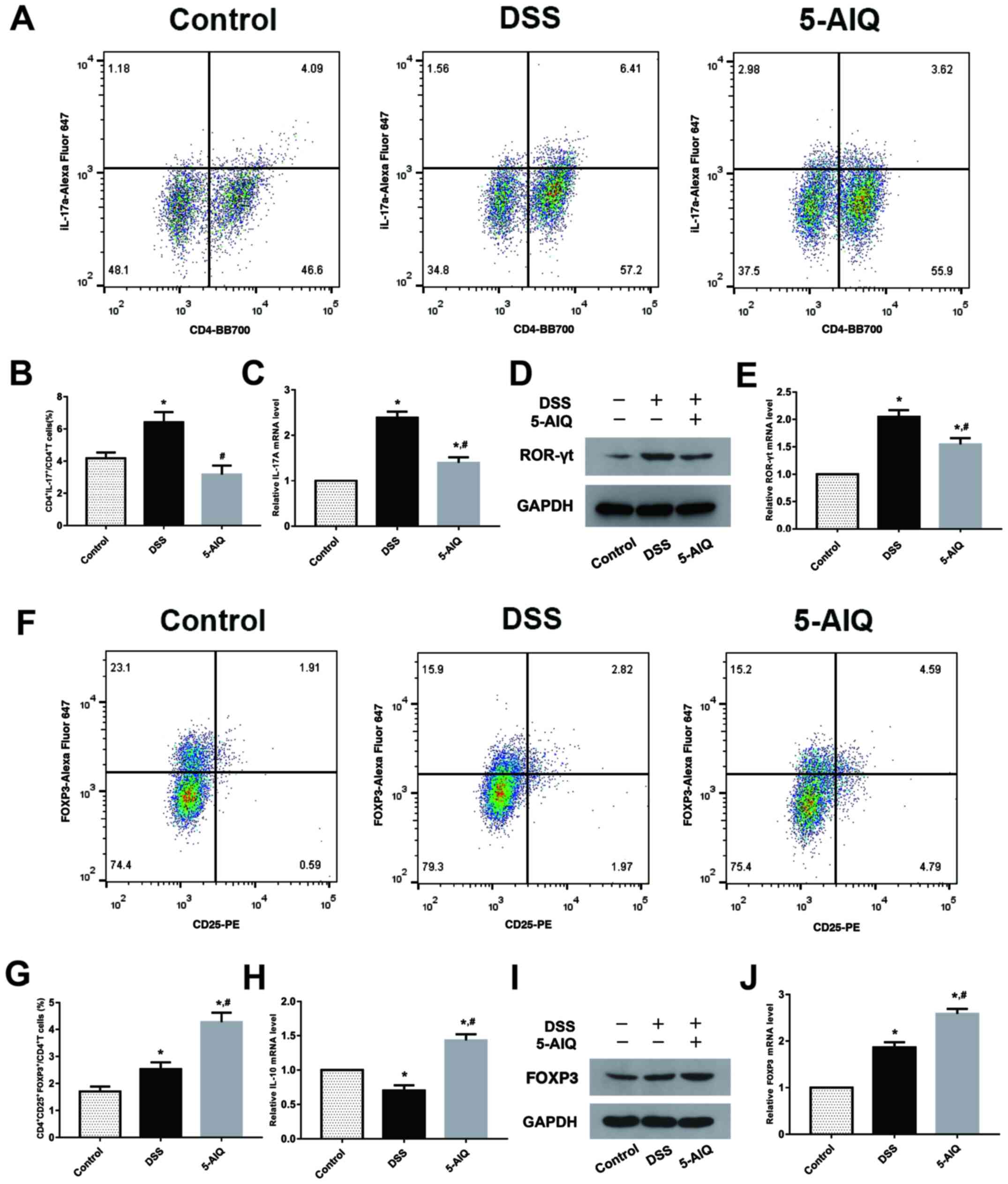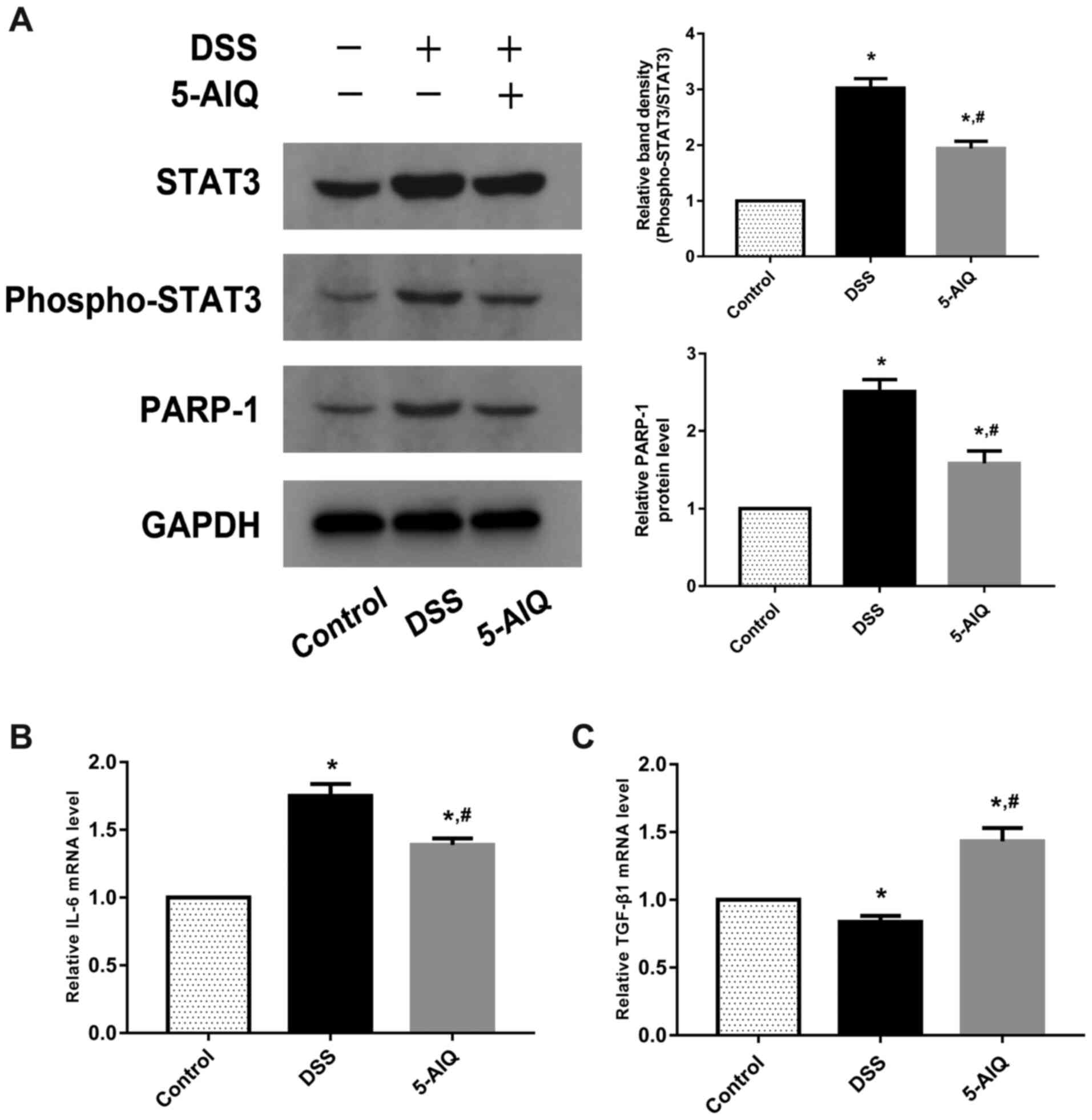|
1
|
Ungaro R, Mehandru S, Allen PB,
Peyrin-Biroulet L and Colombel JF: Ulcerative colitis. Lancet.
389:1756–1770. 2017.PubMed/NCBI View Article : Google Scholar
|
|
2
|
Kaplan GG and Ng SC: Understanding and
preventing the global increase of inflammatory bowel disease.
Gastroenterology. 152:313–321.e2. 2017.PubMed/NCBI View Article : Google Scholar
|
|
3
|
de Souza HSP, Fiocchi C and Iliopoulos D:
The IBD interactome: An integrated view of aetiology, pathogenesis
and therapy. Nat Rev Gastroenterol Hepatol. 14:739–749.
2017.PubMed/NCBI View Article : Google Scholar
|
|
4
|
Torres J and Colombel JF: Genetics and
phenotypes in inflammatory bowel disease. Lancet. 387:98–100.
2016.PubMed/NCBI View Article : Google Scholar
|
|
5
|
Silva FA, Rodrigues BL, Ayrizono ML and
Leal RF: The immunological basis of inflammatory bowel disease.
Gastroenterol Res Pract. 2016(2097274)2016.PubMed/NCBI View Article : Google Scholar
|
|
6
|
Fasching P, Stradner M, Graninger W,
Dejaco C and Fessler J: Therapeutic potential of targeting the
Th17/Treg axis in autoimmune disorders. Molecules.
22(134)2017.PubMed/NCBI View Article : Google Scholar
|
|
7
|
Ueno A, Jeffery L, Kobayashi T, Hibi T,
Ghosh S and Jijon H: Th17 plasticity and its relevance to
inflammatory bowel disease. J Autoimmun. 87:38–49. 2018.PubMed/NCBI View Article : Google Scholar
|
|
8
|
Yamada A, Arakaki R, Saito M, Tsunematsu
T, Kudo Y and Ishimaru N: Role of regulatory T cell in the
pathogenesis of inflammatory bowel disease. World J Gastroenterol.
22:2195–2205. 2016.PubMed/NCBI View Article : Google Scholar
|
|
9
|
Zhang L, Zhang Y, Zhong W, Di C, Lin X and
Xia Z: Heme oxygenase-1 ameliorates dextran sulfate sodium-induced
acute murine colitis by regulating Th17/Treg cell balance. J Biol
Chem. 289:26847–26858. 2014.PubMed/NCBI View Article : Google Scholar
|
|
10
|
Yao J, Wei C, Wang JY, Zhang R, Li YX and
Wang LS: Effect of resveratrol on Treg/Th17 signaling and
ulcerative colitis treatment in mice. World J Gastroenterol.
21:6572–6581. 2015.PubMed/NCBI View Article : Google Scholar
|
|
11
|
Salas A, Hernandez-Rocha C, Duijvestein M,
Faubion W, McGovern D, Vermeire S, Vetrano S and Vande Casteele N:
JAK-STAT pathway targeting for the treatment of inflammatory bowel
disease. Nat Rev Gastroenterol Hepatol. 17:323–337. 2020.PubMed/NCBI View Article : Google Scholar
|
|
12
|
Harbour SN, DiToro DF, Witte SJ, Zindl CL,
Gao M, Schoeb TR, Jones GW, Jones SA, Hatton RD and Weaver CT: TH17
cells require ongoing classic IL-6 receptor signaling to retain
transcriptional and functional identity. Sci Immunol.
5(eaaw2262)2020.PubMed/NCBI View Article : Google Scholar
|
|
13
|
Britton GJ, Contijoch EJ, Mogno I, Vennaro
OH, Llewellyn SR, Ng R, Li Z, Mortha A, Merad M, Das A, et al:
Microbiotas from humans with inflammatory bowel disease alter the
balance of gut Th17 and RORγt+ regulatory T cells and exacerbate
colitis in mice. Immunity. 50:212–224.e4. 2019.PubMed/NCBI View Article : Google Scholar
|
|
14
|
Gong Y, Lin Y, Zhao N, He X, Lu A, Wei W
and Jiang M: The Th17/Treg immune imbalance in ulcerative colitis
disease in a Chinese han population. Mediators Inflamm.
2016(7089137)2016.PubMed/NCBI View Article : Google Scholar
|
|
15
|
Gupte R, Liu Z and Kraus WL: PARPs and
ADP-ribosylation: Recent advances linking molecular functions to
biological outcomes. Genes Dev. 31:101–126. 2017.PubMed/NCBI View Article : Google Scholar
|
|
16
|
Rosado MM, Bennici E, Novelli F and Pioli
C: Beyond DNA repair, the immunological role of PARP-1 and its
siblings. Immunology. 139:428–437. 2013.PubMed/NCBI View Article : Google Scholar
|
|
17
|
Abd Elmageed ZY, Naura AS, Errami Y and
Zerfaoui M: The poly(ADP-ribose) polymerases (PARPs): New roles in
intracellular transport. Cell Signal. 24:1–8. 2012.PubMed/NCBI View Article : Google Scholar
|
|
18
|
Ba X and Garg NJ: Signaling mechanism of
poly(ADP-ribose) polymerase-1 (PARP-1) in inflammatory diseases. Am
J Pathol. 178:946–955. 2011.PubMed/NCBI View Article : Google Scholar
|
|
19
|
Sodhi RK, Singh N and Jaggi AS:
Poly(ADP-ribose) polymerase-1 (PARP-1) and its therapeutic
implications. Vascul Pharmacol. 53:77–87. 2010.PubMed/NCBI View Article : Google Scholar
|
|
20
|
Quesada A, O'Valle F, Montoro-Molina S,
Gómez-Morales M, Caba-Molina M, González JF, de Gracia MC, Osuna A,
Vargas F and Wangensteen R: 5-aminoisoquinoline improves renal
function and fibrosis during recovery phase of cisplatin-induced
acute kidney injury in rats. Biosci Rep.
38(BSR20171313)2018.PubMed/NCBI View Article : Google Scholar
|
|
21
|
Fehr AR, Singh SA, Kerr CM, Mukai S,
Higashi H and Aikawa M: The impact of PARPs and ADP-ribosylation on
inflammation and host-pathogen interactions. Genes Dev. 34:341–359.
2020.PubMed/NCBI View Article : Google Scholar
|
|
22
|
Luo X, Nie J, Wang S, Chen Z, Chen W, Li
D, Hu H and Li B: Poly(ADP-ribosyl)ation of FOXP3 protein mediated
by PARP-1 protein regulates the function of regulatory T cells. J
Biol Chem. 290:28675–28682. 2015.PubMed/NCBI View Article : Google Scholar
|
|
23
|
Threadgill MD: 5-Aminoisoquinolin-1-one
(5-AIQ), a water-soluble inhibitor of the
poly(ADP-Ribose)polymerases (PARPs). Curr Med Chem. 22:3807–3829.
2015.PubMed/NCBI View Article : Google Scholar
|
|
24
|
Brady PN, Goel A and Johnson MA:
Poly(ADP-Ribose) polymerases in host-pathogen interactions,
inflammation, and immunity. Microbiol Mol Biol Rev. 83:e00038–18.
2019.PubMed/NCBI View Article : Google Scholar
|
|
25
|
Wirtz S, Popp V, Kindermann M, Gerlach K,
Weigmann B, Fichtner-Feigl S and Neurath MF: Chemically induced
mouse models of acute and chronic intestinal inflammation. Nat
Protoc. 12:1295–1309. 2017.PubMed/NCBI View Article : Google Scholar
|
|
26
|
Ahmad SF, Zoheir KM, Bakheet SA, Ashour AE
and Attia SM: Poly(ADP-ribose) polymerase-1 inhibitor modulates T
regulatory and IL-17 cells in the prevention of adjuvant induced
arthritis in mice model. Cytokine. 68:76–85. 2014.PubMed/NCBI View Article : Google Scholar
|
|
27
|
Livak KJ and Schmittgen TD: Analysis of
relative gene expression data using real-time quantitative PCR and
the 2(-Delta Delta C(T)) method. Methods. 25:402–408.
2001.PubMed/NCBI View Article : Google Scholar
|
|
28
|
Gibson BA and Kraus WL: New insights into
the molecular and cellular functions of poly(ADP-ribose) and PARPs.
Nat Rev Mol Cell Biol. 13:411–424. 2012.PubMed/NCBI View
Article : Google Scholar
|
|
29
|
Hassa PO and Hottiger MO: The functional
role of poly(ADP-ribose)polymerase 1 as novel coactivator of
NF-kappaB in inflammatory disorders. Cell Mol Life Sci.
59:1534–1553. 2002.PubMed/NCBI View Article : Google Scholar
|
|
30
|
Niyazoglu M, Baykara O, Koc A, Aydoğdu P,
Onaran I, Dellal FD, Tasan E and Sultuybek GK: Association of
PARP-1, NF-κB, NF-κBIA and IL-6, IL-1β and TNF-α with graves
disease and graves ophthalmopathy. Gene. 547:226–232.
2014.PubMed/NCBI View Article : Google Scholar
|
|
31
|
Dharwal V and Naura AS: PARP-1 inhibition
ameliorates elastase induced lung inflammation and emphysema in
mice. Biochem Pharmacol. 150:24–34. 2018.PubMed/NCBI View Article : Google Scholar
|
|
32
|
Larmonier CB, Shehab KW, Laubitz D, Jamwal
DR, Ghishan FK and Kiela PR: Transcriptional reprogramming and
resistance to colonic mucosal injury in poly(ADP-ribose) polymerase
1 (PARP1)-deficient mice. J Biol Chem. 291:8918–8930.
2016.PubMed/NCBI View Article : Google Scholar
|
|
33
|
Cuzzocrea S, McDonald MC, Mazzon E, Dugo
L, Serraino I, Threadgill M, Caputi AP and Thiemermann C: Effects
of 5-aminoisoquinolinone, a water-soluble, potent inhibitor of the
activity of poly(ADP-ribose) polymerase, in a rodent model of lung
injury. Biochem Pharmacol. 63:293–304. 2002.PubMed/NCBI View Article : Google Scholar
|
|
34
|
Di Paola R, Genovese T, Caputi AP,
Threadgill M, Thiemermann C and Cuzzocrea S: Beneficial effects of
5-aminoisoquinolinone, a novel, potent, water-soluble, inhibitor of
poly(ADP-ribose) polymerase, in a rat model of splanchnic artery
occlusion and reperfusion. Eur J Pharmacol. 492:203–210.
2004.PubMed/NCBI View Article : Google Scholar
|
|
35
|
Ahmad SF, Zoheir KM, Ansari MA, Korashy
HM, Bakheet SA, Ashour AE, Al-Shabanah OA, Al-harbi MM and Attia
SM: The role of poly(ADP-ribose) polymerase-1 inhibitor in
carrageenan-induced lung inflammation in mice. Mol Immunol.
63:394–405. 2015.PubMed/NCBI View Article : Google Scholar
|
|
36
|
Yang B, Guo WY, Yu J, Zhao KL, Shi Q, Zuo
T and Wang WX: Expression of PARP/NF-κB and intervention effect of
5-AIQ/PDTC in SAP rats with adrenal damage. Zhonghua Yi Xue Za Zhi.
93:3063–3067. 2013.PubMed/NCBI(In Chinese).
|
|
37
|
Neurath MF: Cytokines in inflammatory
bowel disease. Nat Rev Immunol. 14:329–342. 2014.PubMed/NCBI View Article : Google Scholar
|
|
38
|
Fonseca-Camarillo G and Yamamoto-Furusho
JK: Immunoregulatory pathways involved in inflammatory bowel
disease. Inflamm Bowel Dis. 21:2188–2193. 2015.PubMed/NCBI View Article : Google Scholar
|
|
39
|
Hayden MS and Ghosh S: NF-kappaB in
immunobiology. Cell Res. 21:223–244. 2011.PubMed/NCBI View Article : Google Scholar
|
|
40
|
Atreya I, Atreya R and Neurath MF:
NF-kappaB in inflammatory bowel disease. J Intern Med. 263:591–596.
2008.PubMed/NCBI View Article : Google Scholar
|
|
41
|
de Souza HS and Fiocchi C:
Immunopathogenesis of IBD: Current state of the art. Nat Rev
Gastroenterol Hepatol. 13:13–27. 2016.PubMed/NCBI View Article : Google Scholar
|
|
42
|
Wallace KL, Zheng LB, Kanazawa Y and Shih
DQ: Immunopathology of inflammatory bowel disease. World J
Gastroenterol. 20:6–21. 2014.PubMed/NCBI View Article : Google Scholar
|
|
43
|
van Wijk F and Cheroutre H: Intestinal T
cells: Facing the mucosal immune dilemma with synergy and
diversity. Semin Immunol. 21:130–138. 2009.PubMed/NCBI View Article : Google Scholar
|
|
44
|
Zenewicz LA, Antov A and Flavell RA: CD4
T-cell differentiation and inflammatory bowel disease. Trends Mol
Med. 15:199–207. 2009.PubMed/NCBI View Article : Google Scholar
|
|
45
|
Liu TC and Stappenbeck TS: Genetics and
pathogenesis of inflammatory bowel disease. Annu Rev Pathol.
11:127–148. 2016.PubMed/NCBI View Article : Google Scholar
|
|
46
|
Yang BH, Hagemann S, Mamareli P, Lauer U,
Hoffmann U, Beckstette M, Föhse L, Prinz I, Pezoldt J, Suerbaum S,
et al: Foxp3(+) T cells expressing RORγt represent a stable
regulatory T-cell effector lineage with enhanced suppressive
capacity during intestinal inflammation. Mucosal Immunol.
9:444–457. 2016.PubMed/NCBI View Article : Google Scholar
|
|
47
|
Ohnmacht C, Park JH, Cording S, Wing JB,
Atarashi K, Obata Y, Gaboriau-Routhiau V, Marques R, Dulauroy S,
Fedoseeva M, et al: Mucosal immunology. The microbiota regulates
type 2 immunity through RORγt+ T cells. Science.
349:989–993. 2015.PubMed/NCBI View Article : Google Scholar
|
|
48
|
Higashimura Y, Takagi T, Naito Y, Uchiyama
K, Mizushima K, Tanaka M, Hamaguchi M and Itoh Y: Zinc deficiency
activates the IL-23/Th17 axis to aggravate experimental colitis in
mice. J Crohns Colitis. 14:856–866. 2020.PubMed/NCBI View Article : Google Scholar
|
|
49
|
Britton GJ, Contijoch EJ, Spindler MP,
Aggarwala V, Dogan B, Bongers G, San Mateo L, Baltus A, Das A,
Gevers D, et al: Defined microbiota transplant restores
Th17/RORγt+ regulatory T cell balance in mice colonized
with inflammatory bowel disease microbiotas. Proc Natl Acad Sci
USA. 117:21536–21545. 2020.PubMed/NCBI View Article : Google Scholar
|
|
50
|
Xu M, Duan XY, Chen QY, Fan H, Hong ZC,
Deng SJ, Nan Z, Wu H, Dong YL, Liu YJ and Zhou CZ: Effect of
compound sophorae decoction on dextran sodium sulfate (DSS)-induced
colitis in mice by regulating Th17/Treg cell balance. Biomed
Pharmacother. 109:2396–2408. 2019.PubMed/NCBI View Article : Google Scholar
|
|
51
|
Luo S, Wen R, Wang Q, Zhao Z, Nong F, Fu
Y, Huang S, Chen J, Zhou L and Luo X: Rhubarb peony decoction
ameliorates ulcerative colitis in mice by regulating gut microbiota
to restoring Th17/Treg balance. J Ethnopharmacol. 231:39–49.
2019.PubMed/NCBI View Article : Google Scholar
|
|
52
|
Serrano C, Galán S, Rubio JF,
Candelario-Martínez A, Montes-Gómez AE, Chánez-Paredes S,
Cedillo-Barrón L, Schnoor M, Meraz-Ríos MA, Villegas-Sepúlveda N,
et al: Compartmentalized response of IL-6/STAT3 signaling in the
colonic mucosa mediates colitis development. J Immunol.
202:1239–1249. 2019.PubMed/NCBI View Article : Google Scholar
|
|
53
|
Coskun M, Salem M, Pedersen J and Nielsen
OH: Involvement of JAK/STAT signaling in the pathogenesis of
inflammatory bowel disease. Pharmacol Res. 76:1–8. 2013.PubMed/NCBI View Article : Google Scholar
|
|
54
|
Hadaschik EN and Enk AH: TGF-β1-induced
regulatory T cells. Hum Immunol. 76:561–564. 2015.PubMed/NCBI View Article : Google Scholar
|
|
55
|
Ghoreschi K, Laurence A, Yang XP, Tato CM,
McGeachy MJ, Konkel JE, Ramos HL, Wei L, Davidson TS, Bouladoux N,
et al: Generation of pathogenic T(H)17 cells in the absence of
TGF-β signalling. Nature. 467:967–971. 2010.PubMed/NCBI View Article : Google Scholar
|
|
56
|
Martincuks A, Andryka K, Küster A,
Schmitz-Van de Leur H, Komorowski M and Müller-Newen G: Nuclear
translocation of STAT3 and NF-κB are independent of each other but
NF-κB supports expression and activation of STAT3. Cell Signal.
32:36–47. 2017.PubMed/NCBI View Article : Google Scholar
|
|
57
|
Pazzaglia S and Pioli C: Multifaceted Role
of PARP-1 in DNA repair and inflammation: Pathological and
therapeutic implications in cancer and non-cancer diseases. Cells.
9(41)2019.PubMed/NCBI View Article : Google Scholar
|
|
58
|
Zhang P, Maruyama T, Konkel JE, Abbatiello
B, Zamarron B, Wang ZQ and Chen W: PARP-1 controls
immunosuppressive function of regulatory T cells by destabilizing
Foxp3. PLoS One. 8(e71590)2013.PubMed/NCBI View Article : Google Scholar
|


















